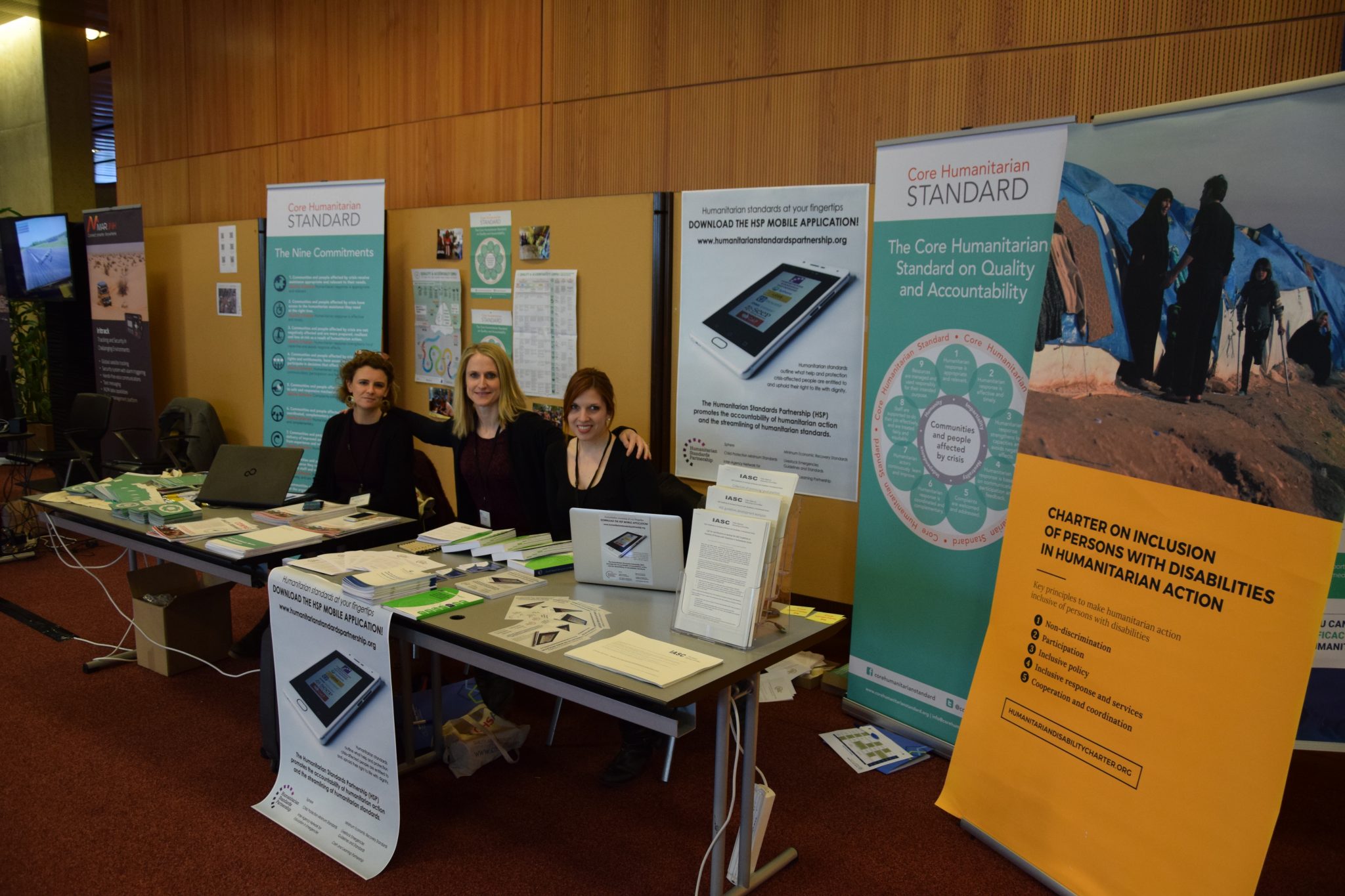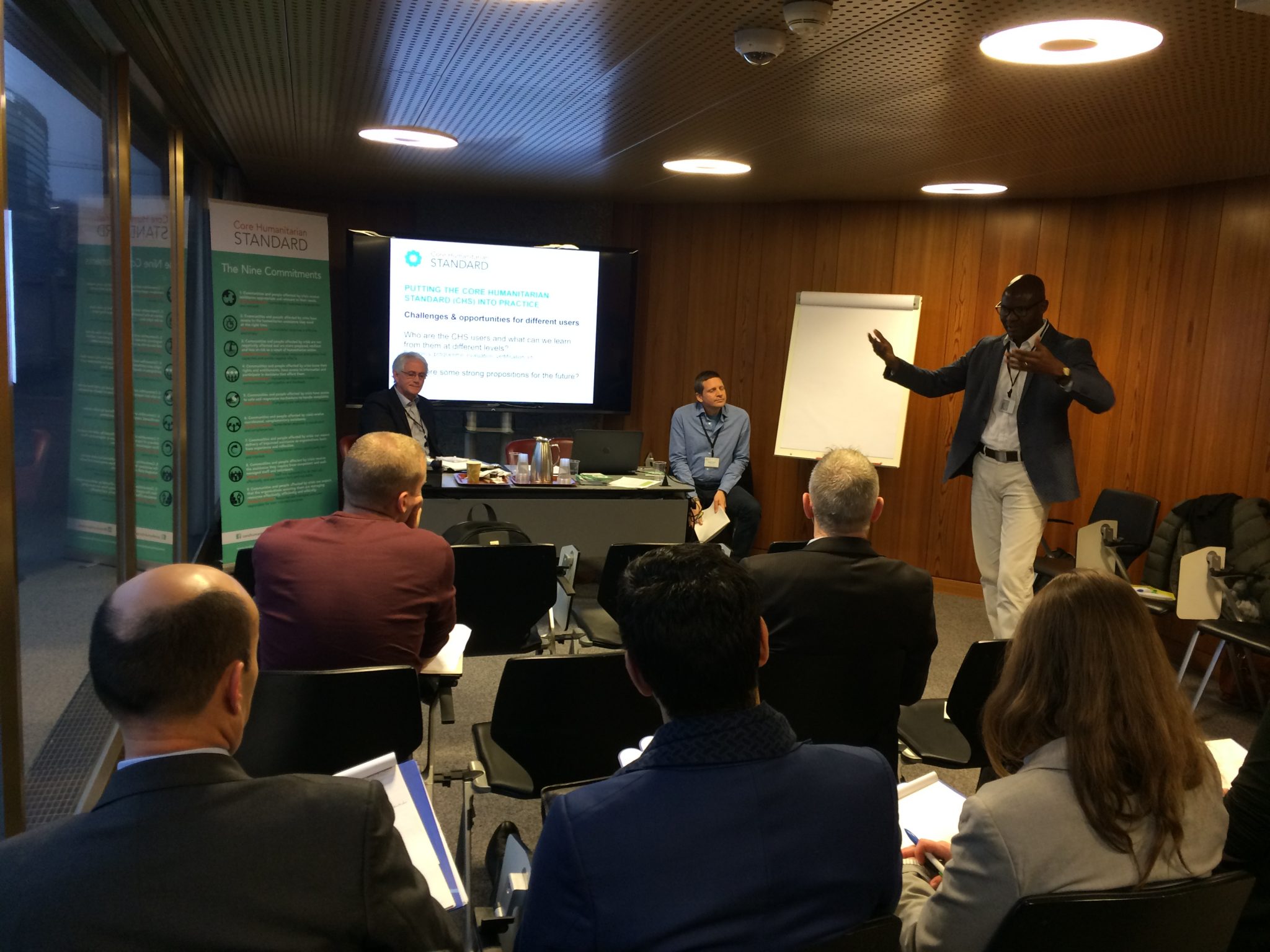Humanitarian Networks and Partnership Week (HNPW) 2018: spotlight on the Core Humanitarian Standard

The three copyright holders of the Core Humanitarian Standard – the CHS Alliance, Groupe URD and Sphere – hosted an information desk at this year’s Humanitarian Network and Partnerships Week (HNPW), took place from 05 to 09 February 2018 and was attended by approximately 1,490 practitioners.
The three founding organisations of the CHS, raised awareness and responded to participants’ questions about the Core Humanitarian Standard and the Quality Compass, of which a revised version was recently published by Groupe URD. They also explained how these tools complement the Sphere standards and announced the future publication of a revised version of the Sphere Handbook, which will incorporate the Core Humanitarian Standard in order to further mainstraim it. Numerous organisations approached our information desk in order to inform us that they are applying the Standard in order to enhance the accountability and quality of their humanitarian or development work.
An Inter-Network-Day took place on 07 February and was opened by Jan Egeland, Secretary-General of the Norwegian Refugee Council. Together with Groupe URD and HQAI, the CHS Alliance facilitated a thematic session on the implementation of the Core Humanitarian Standard in the field and the challenges encountered by different users. Attended by a diversity of actors, from donor agencies to the private sector, the main outcomes of the discussion can be summarised as follows:
- The Core Humanitarian Standard (CHS) is a universal, yet flexible tool; different actors – from donor agencies to affected communities – apply the CHS in different ways, for example by opting for one of the four proposed verification options (self-assessment, peer review, independent verification or third-party certification);
- Local actors are increasingly adopting and applying the CHS, be it by joining the CHS Alliance, by calling upon Groupe URD to get support in applying the standard at project- and/or programme level, or by opting for third-party quality assurance with HQAI, which offers a subsidy fund and group options;
- The CHS can be applied in a collective context, e.g. when assessing the accountability and quality of the humanitarian services delivered to affected people and communities in the aftermath of a particular disaster or in a specific country; the CHS Alliance has recently embarked on a project with Ground Truth Solutions in Chad, supporting the Clusters in integrating the CHS into the Humanitarian Need Overviews (HNO) and the Humanitarian Response Plan (HRP).

In the upcoming months, the copyright holders of the CHS, which is a relatively new standard as it was published at the end of 2014, will be to:
- Build knowledge around the CHS (origin, objective, possibilities, benefits for communities and people affected by crisis) and effectively train new users around the globe;
- Build and share solid content on how the CHS can be used to promote quality and accountability in different contexts;
- Contribute to the localisation agenda by enhancing access of national and local partners to information about the CHS and support in applying the standard and its verification mechanisms;
- Continue testing the application of the CHS in different situations.
Alongside the information desk about the Core Humanitarian Standards, HelpAge and Handicap International presented their newly published the Humanitarian Inclusion Standards for Older People and People with Disabilities.
The Humanitarian Networks and Partnerships Week (HNPW), co-chaired by OCHA and the UK’s Department for International Development (DFID), is an annual event held in Geneva in the first week of February. Since 2015, this event provides a unique forum for humanitarian networks and partnerships to meet and address key humanitarian issues. Networks and Partnerships hold their annual meetings during the week, and work together to find ways to solve common problems. HNPW convenes a large number of participants from diverse groups, including the UN, NGOs, Member States, the Private Sector, the military, academia and others.
